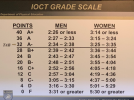To put it simply, it's tough. Casey said it best--it measures functional and overall fitness in a manner that many people have not experienced before. In my case, it was one of the greatest challenges I have encountered at usma. In previous years, PE117 (Military Movement) had been a plebe PE course, however, they switched the program so that plebes now take boxing and PE215, a nutrition/fitness planning-based course. Most yuks now take survival swimming and military movement. I am not sure whether they will continue this plan or revert to the old method in the future.
Nonetheless, when you are taking military movement or "mil move", you will run the IOCT every lesson. Some instructors are nice and will excuse people who TAB the test from taking it every lesson unless they want to improve their grade. Typically people who cannot pass the IOCT in mil move end up failing the course. I believe mil move is the most failed course at usma, but fact check me on this.
When you finish mil move, you take the IOCT in your cow year for a large percentage of your physical GPA. If you tab that test, you won't have to take it again in your WP career. If you pass, you will take it again in your firstie year. If you fail, you continue to take the IOCT for every record exam until you pass and you will be marked as deficient in the physical pillar. In years past, the test was administered yuk year, cow year, and firstie year (you do not have to take the IOCT firstie year if you TAB on your cow year IOCT). Currently, yuks do not take the IOCT for a grade.
Probably the biggest point to make here is that you cannot graduate from usma unless you pass the IOCT. Typical problem areas for cadets are the shelf, rope, or horizontal ladder (aka monkey bars). I will attach a grading scale of the IOCT to this post for reference. Hope this helps.
View attachment 8533

